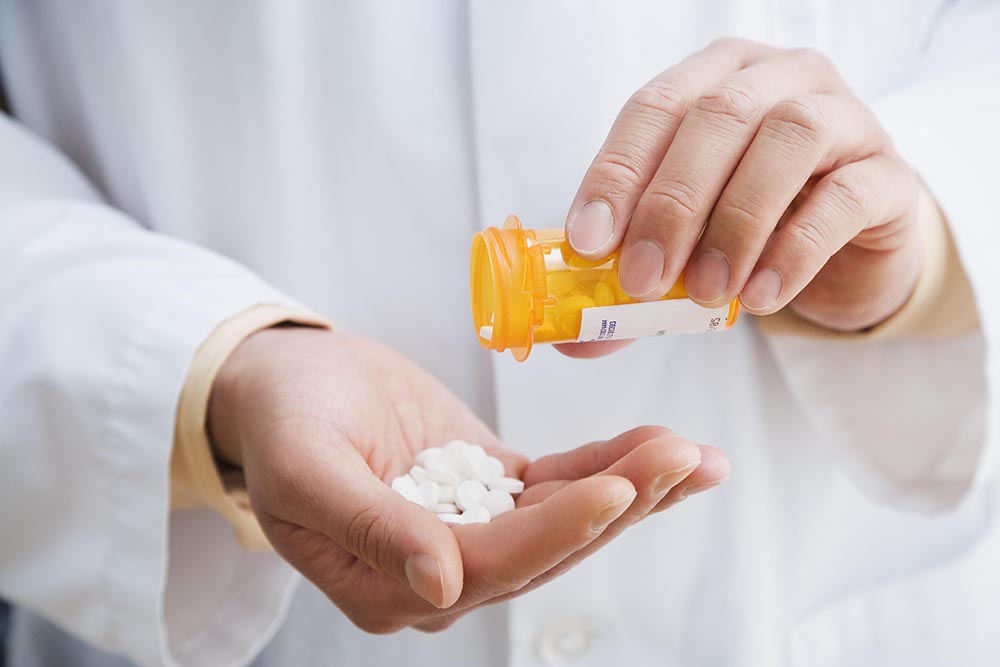Alpha-Blockers: The Whats, Whens, Whys and Hows of High Blood Pressure Meds
CONTENT

Alpha-Blockers
- How Do Alpha-Blockers Work?
- When Are Alpha-Blockers Prescribed?
- Who Is Never Prescribed Alpha-Blockers?
- What Are the Example of Alpha-Blockers?
- Daily Doses
- Side Effects
- Alpha-Blockers and Viagra from Canada
What are alpha-blockers? These are medications that are commonly used for the treatment of high blood pressure as well as minor or severe problems with passing urine in males with the enlargement of the prostate gland (BPH – benign prostatic hyperplasia). Years ago these medications were also prescribed for Raynaud’s phenomenon and heart failure treatments. As for today, they are rarely used for these conditions as there have appeared more effective medications. All alpha-blockers are available as capsules or pills and can be taken up to 3 times daily.

How Do Alpha-Blockers Work?
The main task of an alpha-blocker is revealed by its name: it blocks the transmission of certain nerve impulses. This is how the things go: ends of some nerves release a neurotransmitter when the nerve is stimulated – the chemical is called noradrenaline.
It stimulates alpha-adrenergic receptors, which are very tiny structures that occur in cells of different body parts:
- Smooth muscles;
- Blood vessels;
- Heart.
When the receptors are stimulated, they may lead to different effects. What does an alpha-blocker do? It attaches to alpha-adrenergic receptors and stops them from being stimulated.
The effect never remains unnoticed. Instead it produces various impacts:
When Are Alpha-Blockers Prescribed?
When can a doctor prescribe alpha-blockers? There are two cases: hypertension and prostate gland enlargement.
After all medications have been tried, alpha-blockers are prescribed for cases of high blood pressure.
They are prescribed by healthcare providers, who specialize in hypertension treatment, if only:
- There’s a reason(s) why a patient cannot taken an ACE-inhibitor, diuretic or beta-blocker;
- Other drugs aren’t effective (beta-blockers, ‘water’ pills (diuretics), angiotensin-converting enzyme inhibitors).
Why is it so important to treat hypertension? The thing is that having high blood pressure increases risks of diabetes, heart failure, stroke or heart attack. Alpha-blockers are helpful in lowering down the pressure and reducing risks of such serious conditions.
Though alpha-blockers are regarded as very effective (as effective as other blood pressure lowering drugs), they aren’t as effective as beta-blockers or ACE when it comes to eliminating risks of stroke in some patients. The NICE – National Institute for Health and Care Excellence – provided guidelines for optimal choices for treatment and recommended alpha-blockers only if other meds are contraindicated or ineffective.
When a patient is prescribed alpha-blockers, he will take them in combination with other medications. A success is guaranteed only if 2-3 meds are taken altogether. This isn’t a short-term treatment. It’s a course that lasts for the rest of life.
Alpha-blockers are also used for the treatment of prostate gland enlargement. The choice of these meds always depends on the severity of symptoms.
The most severe condition includes the following signs:
- You wake up many times a night with an urgent need to go to the toilet;
- You wake up EVERY night with an urgent need to go to the toilet;
You feel an urgent need to go to the toilet at the daytime, too.

Who Is Never Prescribed Alpha-Blockers?
Women, who are planning a pregnancy, breastfeeding or pregnant, should not be prescribed alpha-blockers. These medications are not given to females as they trigger loss of bladder control and stress incontinence.
A patient is not suggested to take alpha-blockers, if he has a history of postural hypotension. This is the condition of a sudden drop in blood pressure, when standing up or sitting. If you have ever fainted after passing urine, an alpha-blocker isn’t your choice either.
Some other conditions (their history) include Parkinson’s disease, heart failure, decreased function of kidney or liver.
What Are the Example of Alpha-Blockers?
There are selective and non-selective alpha-blockers. The medication must be swallowed whole. It is forbidden to divide, crush or chew it.
The list of selective alpha-blockers includes:
- Silodosin;
- Doxazosin;
- Alfuzosin;
- Prazosin;
- Terazosin;
- Tamsulosin;
- Yohimbine.
The first six meds are prescribed for cases of benign prostatic hyperplasia and hypertension, while the seventh one relieves vasoconstriction that is associated with Reynaud’s disease.
The list of non-selective alpha-blockers includes:
- Phentolamine: used for short-term treatment of pheochromocytoma;
- Phenoxybenzamine: used for hypertensive crisis, Reynaud’s disease (rarely) and pheochromocytoma.
In case you are prescribed any other pills, especially erectile dysfunction medications like Viagra, their combination must be discussed with a doctor.
Daily Doses of Alpha-Blockers
How many pills of alpha-blockers should be taken daily? The dosage isn’t the choice to be made by a patient. Only a healthcare provider can define the dosage depending on your condition, drug tolerance and other meds consumed.
A single-day preparation of such alpha-blockers as Doxazosin and Terazosin is recommended for hypertension treatment. The preparation promotes patient compliance as there’s more ease and less clutter, beside a patient can remember to take once a day easily. As to Prazosin, it requires multiple dosing a day: about two or three times. It produces a rather significant drop of one’s blood pressure after the first dose consumed.
A single dose of Doxazosin, Alfuzosin or Tamsulosin is taken daily to treat benign prostatic hyperplasia. Why are these meds taken in single doses? The matter is that multiple doses lead to severe side effects, while a single one is not likely to cause any complications.
Alpha-Blockers-Related Side Effects
Today specialists link many side effects and negative body reactions to alpha-blockers. However, generally they are mild. Adverse reactions appear in 14 days after starting the treatment course with an alpha blocker. Yet no side effect lasts long.
There are reported cases of fainting after taking these medications, especially when a patient must administer 2-3 doses daily. How to avoid this? Have a medical check-up and ask your healthcare provider to prescribe a lower dose that may be gradually increased over several weeks.
Here are the common side effects that may be experienced:
- Swelling of eggs or ankles;
- Nausea;
- Headache;
- Feeling dizzy
- Blood pressure drop when standing up or sitting;
- Feeling lethargic or tired.
Some patients also report sleep disturbances, rash, itchy skin, tremor and erection problems (rarely). There are certain medications that aren’t allowed to be taken with alpha-blockers as their combination may lead to a sudden blood pressure drop. These are antidepressants (Mirtazapine), tricyclic antidepressants (Amitriptyline) and PDE5 inhibitors (phosphodiesterase 5 inhibitors used for erectile dysfunction treatment).

Alpha-Blockers and Viagra from Canada
There is a precaution for patients, who are on a regular alpha-blockers treatment course. They aren’t allowed to take PDE5 inhibitors within 24 hours after the administration of alpha-blockers. In case a patient is already taking Viagra from Canada in an optimal dose and has to start taking an alpha-blocker, the latter medication should be prescribed at the lowest dose possible.
Initial studies showed that 25 mg of Viagra Canada and 10 mg of Terazosin administered together resulted in a standing systolic blood pressure of less than 85 mm Hg in 6 patients out of 8. The higher the dose of Sildenafil is, the more complications occur. 50 mg doses of Viagra and 10 mg of Terazosin administered together are associated with hypotension in 2 patients out of 9.
The way a patient responds to these two medications depends on whether he has been on the alpha-blocker acutely or chronically. There was a series of studies conducted that showed the interaction between Sildenafil and Terazosin or Tamsulosin in benign prostatic hypertrophy patients, who had been on a regular alpha-blocker therapy. Zero to several patients dropped the systolic blood pressure to <85 mm Hg. The results were identical whether the drugs were taken 6 hours apart or simultaneously.
This is why Viagra from Canada as well as other PDE5 inhibitors carries precautions as to the use of alpha-blockers. They can develop the orthostatic hypotension, when combined with hypertension pills.
There are many benefits related to the use of alpha-blockers, but one should be careful while administering them. Benefits are expected only if the medications are taken according to prescription and under a supervision of a healthcare provider.
Click here to add your own text
